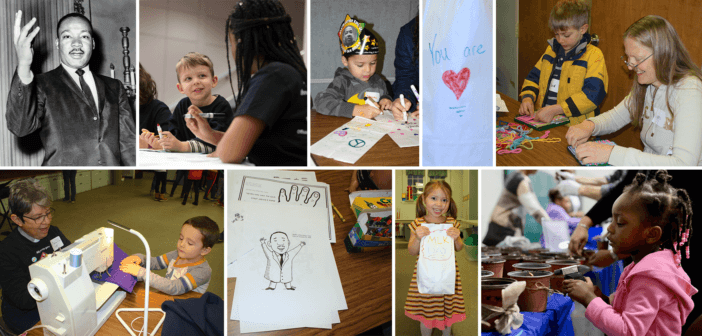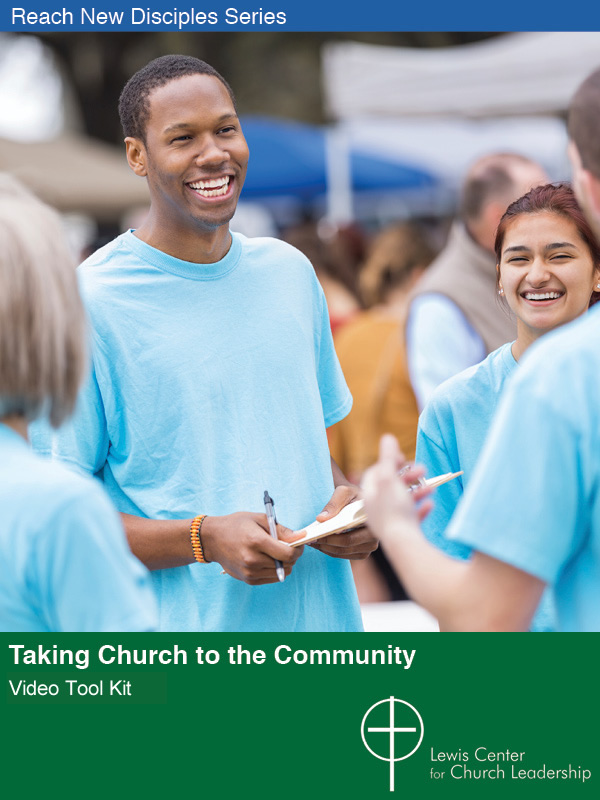Jessica Anschutz of the Lewis Center staff reports on how a Connecticut church has made the Martin Luther King Jr. holiday a time for intergenerational learning and service. She shares tips on how churches large or small might launch a similar effort to educate and inspire young people and connect with the broader community.
In 2013 when Maria-Pia Seirup learned her Divinity School would be closed in honor of Martin Luther King Jr. Day, she seized the opportunity to develop a service day for families at Jesse Lee Memorial United Methodist Church. Families and friends were invited to come to the fellowship hall from 10 a.m. to noon to learn about Martin Luther King Jr. and complete a variety of projects in partnership with area nonprofit agencies. Her approach to organizing a Morning of Service is a wonderful way for churches large and small to provide a meaningful intergenerational ministry opportunity.
1. Start with purpose.
The gathering began with a teach-in about Martin Luther King Jr. While the children knew a little bit about MLK, they did not always recognize him as a spiritual leader. Maria-Pia “wanted them to come away with a sense that he was the Reverend Doctor Martin Luther King Jr., and that participation in the civil rights movement was a spiritual calling and a grassroots effort largely based in churches.” The annual program includes a video, book, or a storyteller sharing about MLK Jr., as well as the teaching of freedom songs, and a brief lesson about how freedom songs pulled civil rights activists together and gave them strength and courage, even when in jail.
2. Provide kid-friendly service activities.
After the teach-in, participants are invited to explore how they, too, could live out the legacy of this historic man by participating in a variety of service projects. Fourth and fifth-grade volunteers introduce each of the service projects and the community partners the projects support. Then families are invited to move freely through the various stations. The projects have changed and evolved over time, but have included making sandwiches and bag lunches, baking muffins, sewing fleece hats and scarves and quilts for refugee families, and making dog toys for a local rescue shelter.
3. Start small.
Making bag lunches may be plenty to start with, but keep in mind that a few families can easily make 100 bag lunches in an hour or two, especially if you do it assembly line style. Start by inviting the participants to decorate the lunch bags in ways that honor and celebrate the day. Then, make sandwiches and fill the bags. Be sure to have an adult at the end of the line to check each bag and make sure it has everything. Jesse Lee UMC added dog toys, muffin making, and weaving potholders over time because they had such large groups of people.
4. Offer a break from the busyness.
In addition to the service projects, a story book station was offered in a quieter space with books about MLK Jr. for a range of reading levels. This was a place of respite for children who needed a break from the noisy busyness of the service projects. Here a parent or older child could read to the youngest children while still focusing on the theme of the day.
5. Engage volunteers of all ages.
Middle school and high school students take the lead guiding participants through the service projects. Adult volunteers shop in advance, prep the supplies, supervise, teach craft skills, and deliver items after the event. Maria-Pia recruited a two people to come with their sewing machines and to teach people to sew. It was “a joy to see older adults teaching a child or an adult how to sew.” The children were fascinated by the sewing machines.
6. Encourage financial donations.
While this ministry is supported through the church’s mission budget, people are also willing to make donations. Rather than rely on people to bring things like bread, cheese, etc., encourage people to make a financial donation to support the day. This way you can be sure to have all the supplies on hand that morning. For example, the cost per bag lunch was estimated to be $2.50 so people were encouraged to sponsor a lunch (or 10 or more).
7. Invite the community.
The MLK Morning of Service has grown over time mostly by word of mouth. A large banner in front of the church advertising the date and time reads “FAMILIES WELCOME.” Publicity to church families encourages them to invite friends and neighbors. The Girl Scout and Brownie Troops who meet at the church were invited and came in uniform.
8. End on a high note.
At the end of the event, everyone gathered in a big circle to sing one of the freedom songs they had learned and celebrate their efforts by counting everything they made. A few families designated as counters stacked hats and scarves and dog toys in piles of 10, so that the group could easily count aloud together the totals. “Ten, twenty, thirty ….” And someone would announce the total number of bagged lunches. This gives everyone a sense of accomplishment and an opportunity to see the fruits of the service. The event concludes with a reminder of the life and legacy of the Rev. Dr. Martin Luther King Jr. and a closing prayer.
9. Build connections.
The MLK Service Day has become a collaborative project involving the church’s outreach and children’s and youth committees. Families who have never been to the church before participate. People learn about area agencies and the people they serve. Children and youth are empowered to lead. A welcome, yet unexpected outcome of the Morning of Service, was the launch of “Spirit Stitchers” a group that gathers monthly to work on their own community projects.
Program participants also served a hot lunch at the nearby Dorothy Day Hospitality House and provided the guests with sandwiches for dinner. The guests were very touched that children and families provided meals for them, and it brightened their day to be part of commemorating MLK Day. Maria-Pia said, “I think a lot of times when you are down and out you lose perspective, and you don’t realize that there are other people in the world who care about you and are willing to help.”
Rev. Maria-Pia Seirup is a contemplative artisan and ordained Deacon in the United Methodist Church, former director of Children’s Ministries at Jesse Lee Memorial UMC in Ridgefield, Connecticut, and founder of PeaceWork, Inc. For more information, please email peaceworkbymp@gmail.com.
Related Resources
- Intergenerational Ministry for the Post-Pandemic Church by Doug Powe
- The New Church Family by Ann A. Michel
- “What is Messy Church?,” a Leading Ideas Talks podcast episode featuring Johannah Myers







